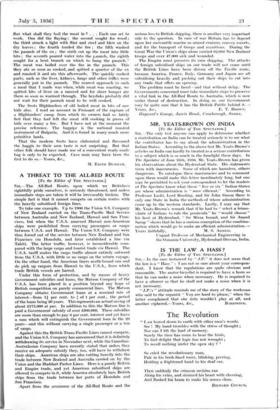A THREAT TO THE ALL-RED ROUTE
[To the Editor of THE SPECTATOR.] •
SIR,—The All-Red Route, upon which we Britishers rightfully pride ourselves, is seriously threatened, and unless immediate steps are taken it will be irrevocably broken. The simple fact is that it cannot compete on certain routes with the heavily subsidised foreign lines.
To take one example.. Up to 1900 the Union S.S.Company . .
of New Zealand carried on the Trans-Pacific Mail Service between Australia and New Zealand, Hawaii and ,San Fran cisco, but when the U.S.A. annexed Hawaii noikAmerican ships were prohibited from carrying passengers, or cargo between U.S.A. and Hawaii. The Union S.S. Company were thus forced out of the service between New Zealand and San Francisco via Honolulu, and later established a line via Tahiti. The latter traffic, however, is inconsiderable com- pared with the large cargo and tourist trade via Hawaii. The U.S.A. tariff makes the cargo traffic almost entirely outward from the U.S.A. with little or no cargo on the return voyage. On the other hand, the American liners north-bound can and do pick up cargoes from Hawaii to the .U.S.A., from which trade British vessels are barred.
Under this form of protection, and by means of heavy Government subsidies and loans, the Matson Company of the U.S.A. has been placed in a position beyond any hope of British competition on purely commercial lines. The Matson Company obtains Government loans at a nominal rate of interest—from 1i per cent. to d of 1 per cent., the period of the loans being 20 years. This represents an actual saving of about £175,000 at par. In addition to this the Matson line is paid a Government subsidy of over £300,000. These subsidies are more than enough to pay 6 per cent. interest and yet leave a sum which will extinguish the Government loan in the 20 years—and this without carrying a single passenger or a ton of cargo:
Against this the British Trans-Pacific Lines cannot compete, and the Union S.S. Company has announced that, it is definitely withdrawing its service in November next, while the Canadian- Australasian Company have recently stated that unless they receive maudequate subsidy they, too, will have to withdraw their -ships.- American ships are also cutting heavily into the trade between New Zealand and Australia carried on by the Union and the Huddart Parker Lines.. Here is a purely British and Empire trade, and -yet American subsidised ships are allowed to compete in it, while America absolutely bars British ships from the trade between her ports of Honolulu and San Francisco. •..••• • .. .Apart from the severance of the All-Red- Route and the serious loss to British shipping, there is another very important side to the' question. In case of war Britain has to depend upon her mercantile marine as armed cruisers, convoy escorts, and for the transport of troops and munitions. During the Great War the Union's ships alone carried 62,000 New Zealand troops and over 47,000 sick and *wounded.
The Empire must preserve its own shipping. The attacks of foreign subsidised ships on our trade will not cease until the British Lines have been driven off the Pacific route, because America, France, Italy, Germany and Japan are all subsidising heavily and pushing out their ships to cut into any trade that offers an opening.
The problem must be faced—and that without delay. The Governments concerned must take immediate steps to preserve a vital link in the All-Red Route to Australia, which is now under threat of destruction. In doing so, our Government may be quite sure that it has the British Public behind it.—
Yours, &c., E. T. BROWN. Ilaywards Grange, Jarvis Brook, Crouborough, Sussex.














































 Previous page
Previous page